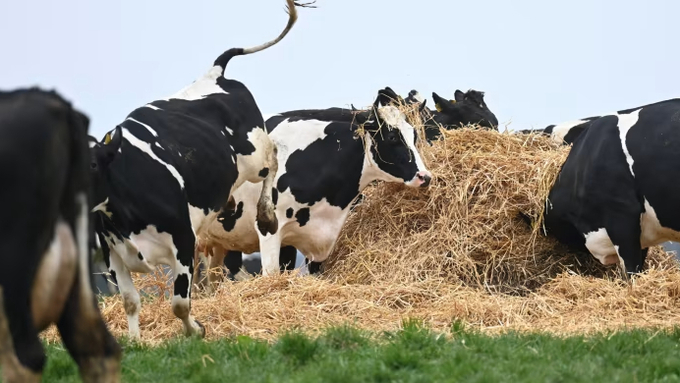May 19, 2025 | 18:15 GMT +7
May 19, 2025 | 18:15 GMT +7
Hotline: 0913.378.918
May 19, 2025 | 18:15 GMT +7
Hotline: 0913.378.918

Livestock accounts for 11% of global emissions, with almost two-thirds of that driven by cows.
Denmark is moving ahead with the world’s first carbon tax on agriculture, with cattle farmers set to be charged almost €100 a year for the greenhouse gas emissions from each of their cows.
After months of fraught negotiations with trade bodies and environmental groups, Denmark’s ruling coalition on Monday night agreed an effective tax rate of DKr120 (€16) per tonne of carbon dioxide equivalent emissions from livestock, including cows and pigs.
Countries around the world are struggling to cut emissions from food production — which accounts for almost a quarter of global emissions including land use changes — while maintaining food security.
Ruminant animals such as cows and sheep produce methane through their digestive systems, while synthetic nitrogen fertilisers in the grass they eat also produce greenhouse gases. Livestock accounts for 11 per cent of global emissions, with almost two-thirds of that driven by cows.
The Danish agreement, which lays the ground for the levy to be introduced in 2030, comes just months after farmers protested across Europe against EU environmental measures. Mette Frederiksen, Denmark’s centre-left prime minister, said she hoped the tax would “pave the way forward regionally and globally” for similar initiatives.
Farmers organisation Bæredygtigt Landbrug, which was not involved in the talks, immediately criticised the deal, while some green organisations privately argued there were too many deductions for the tax to be effective.
“I think it’s crazy,” said Peter Kiær, chair of Bæredygtigt Landbrug, adding that it would hinder much-needed technology investment in a country that was already one of the world’s greenest agricultural producers. “[The government] aren’t listening to the farmers.”
Denmark’s parliament is expected to vote to approve the tax later this year, which has a headline rate of DKr300 per tonne of CO₂ equivalent in 2030, rising to DKr750 per tonne CO₂ equivalent in 2035. There are built-in incentives for farmers to reduce emissions, and the tax will be phased in with a basic tax deduction of 60 per cent for at least the first two years.
The average Danish cow produces six tonnes of CO₂ equivalent per year, according to green think-tank Concito. Using the lower tax rate of DKr120 would incur a charge of about DKr720, or €96.50. Cows produce far higher emissions than pork, although the country’s pig farmers will also be caught by the new tax. The country is a big dairy and pork exporter.
Lars Aagaard, the country’s climate minister, said agriculture was Denmark’s largest greenhouse gas emitter. “This cannot continue,” he said. “Agriculture must contribute and be part of the green future.”
Søren Søndergaard, chair of the Danish Agriculture & Food Council, said: “We have succeeded — against all odds — in getting a tax model where the farmer who uses approved and economically sustainable climate solutions can completely avoid the tax.”
But Peder Tuborgh, chief executive of Denmark-based dairy co-operative Arla Foods, said the tax regime could unfairly affect some farmers, including organic producers, who were doing everything they could to reduce their emissions, and he called for policymakers to further examine this.
New Zealand this month scrapped an attempt to launch a similar tax on sheep and cow farmers in an effort to cut methane emissions.
The European Commission is studying how it could set up an EU-wide agricultural emissions trading system, looking at options including requiring farmers and landowners to pay directly for their emissions.
Kristian Hundebøll, chief executive of DLG Group, one of Europe’s biggest agribusinesses, a co-operative owned by 25,000 Danish farmers, said it was “crucial” for the tax to be “anchored in Europe” rather than for Denmark to act unilaterally.
At an event held in Brussels last week, Alexandre Paquot, deputy director-general of the commission’s climate arm, said bringing agriculture into the bloc’s emissions trading system should present a “new business case and new opportunities for farmers”.
(FT)

(VAN) Fourth most important food crop in peril as Latin America and Caribbean suffer from slow-onset climate disaster.

(VAN) Shifting market dynamics and the noise around new legislation has propelled Trouw Nutrition’s research around early life nutrition in poultry. Today, it continues to be a key area of research.

(VAN) India is concerned about its food security and the livelihoods of its farmers if more US food imports are allowed.

(VAN) FAO's Director-General emphasises the need to work together to transform agrifood systems.

(VAN) Europe is facing its worst outbreak of foot-and-mouth since the start of the century.

(VAN) The central authorities, in early April, released a 10-year plan for rural vitalization.

(VAN) Viterra marked a significant milestone in its carbon measurement program in Argentina, called Ígaris, reaching 1 million soybean hectares measured.